| Associate justice | Replacing | Date confirmed
(Vote) | Tenure [a] | Appointed by | Prior position [b] |
|---|
| 1 | 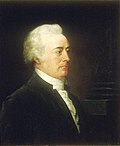 | John Rutledge | (new seat) | September 26, 1789
(Acclamation) | February 15, 1790
–
March 4, 1791
(Resigned) [c] | George Washington | 31st
governor of South Carolina
(1779–1782) |
| 2 |  | William Cushing [d] | (new seat) | September 26, 1789
(Acclamation) | February 2, 1790
–
September 13, 1810
(Died) | Chief Justice of the
Massachusetts Superior Court
(1777–1789) |
| 3 |  | James Wilson | (new seat) | September 26, 1789
(Acclamation) | October 5, 1789
–
August 21, 1798
(Died) | Delegate to the
Constitutional Convention
(1787) |
| 4 |  | John Blair | (new seat) | September 26, 1789
(Acclamation) | February 2, 1790
–
October 25, 1795
(Resigned) | Member of the
Virginia House of Burgesses
(1766–1770) |
| 5 |  | James Iredell | (new seat) | February 10, 1790
(Acclamation) | May 12, 1790
–
October 20, 1799
(Died) | 2nd
attorney general of North Carolina
(1779–1782) |
| 6 | 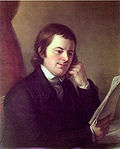 | Thomas Johnson | J. Rutledge | November 7, 1791
(Acclamation) | September 19, 1791 [e]
–
January 16, 1793
(Resigned) | 1st
governor of Maryland
(1777–1779) |
| 7 |  | William Paterson | T. Johnson | March 4, 1793
(Acclamation) | March 11, 1793
–
September 8, 1806
(Died) | 2nd
governor of New Jersey
(1790–1793) |
| 8 |  | Samuel Chase [f] | Blair | January 27, 1796
(Acclamation) | February 4, 1796
–
June 19, 1811
(Died) | Chief Justice of the
Maryland General Court
(1791–1796) |
| 9 |  | Bushrod Washington | Wilson | December 20, 1798
(Acclamation) | November 9, 1798 [e]
–
November 26, 1829
(Died) | John Adams | Delegate to the
Virginia Ratifying Convention
(1788) |
| 10 | 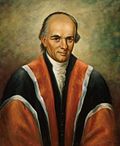 | Alfred Moore | Iredell | December 9, 1799
(Acclamation) | April 21, 1800
–
January 26, 1804
(Resigned) | 3rd
attorney general of North Carolina
(1782–1791) |
| 11 | 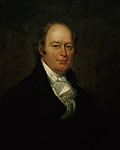 | William Johnson | Moore | March 24, 1804
(Acclamation) | May 7, 1804
–
August 4, 1834
(Died) | Thomas Jefferson | Speaker of the
South Carolina House of Representatives
(1798–1800) |
| 12 |  | Henry Brockholst Livingston | Paterson | December 17, 1806
(Acclamation) | January 20, 1807 [e]
–
March 18, 1823
(Died) | Justice of the
New York Supreme Court
(1802–1807) |
| 13 |  | Thomas Todd | (new seat) | March 2, 1807
(Acclamation) | March 4, 1807
–
February 7, 1826
(Died) | Chief Justice of the
Kentucky Court of Appeals
(1806–1807) |
| 14 |  | Gabriel Duvall | Chase | November 18, 1811
(Acclamation) | November 23, 1811
–
January 12, 1835
(Resigned) | James Madison | U.S. representative for
Maryland's 2nd district
(1794–1796) |
| 15 |  | Joseph Story | Cushing | November 18, 1811
(Acclamation) | February 3, 1812
–
September 10, 1845
(Died) | U.S. representative for
Massachusetts's 2nd district
(1808–1809) |
| 16 |  | Smith Thompson | Livingston | December 9, 1823
(Acclamation) | September 1, 1823 [e]
–
December 18, 1843
(Died) | James Monroe | 6th
United States secretary of the Navy
(1819–1823) |
| 17 | 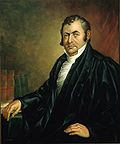 | Robert Trimble | Todd | May 9, 1826
(25–5) | June 16, 1826
–
August 25, 1828
(Died) | John Quincy Adams | Judge of the
United States District Court
for the District of Kentucky
(1817–1826) |
| 18 |  | John McLean | Trimble | March 7, 1829
(Acclamation) | March 12, 1829
–
April 4, 1861
(Died) | Andrew Jackson | 6th
United States postmaster general
(1823–1829) |
| 19 | 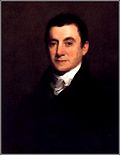 | Henry Baldwin | Washington | January 6, 1830
(41–2) | January 18, 1830
–
April 21, 1844
(Died) | U.S. representative for
Pennsylvania's 14th district
(1817–1822) |
| 20 |  | James M. Wayne | W. Johnson | January 9, 1835
(Acclamation) | January 14, 1835
–
July 5, 1867
(Died) | U.S. representative for
Georgia's at-large district
(1829–1835) |
| 21 |  | Philip P. Barbour | Duvall | March 15, 1836
(30–11) | May 12, 1836
–
February 25, 1841
(Died) | Judge of the
United States District Court
for the Eastern District of Virginia
(1830–1836) |
| 22 | 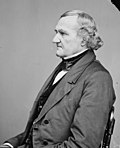 | John Catron | (new seat) | March 8, 1837
(28–15) | May 1, 1837
–
May 30, 1865
(Died) | Judge of the
Tennessee Supreme Court
of Errors and Appeals
(1824–1834) |
| 23 |  | John McKinley | (new seat) | September 25, 1837
(Acclamation) | January 9, 1838 [e]
–
July 19, 1852
(Died) | Martin Van Buren | United States senator
from Alabama
(1826–1831, 1837) |
| 24 |  | Peter V. Daniel | Barbour | March 2, 1841
(25–5) | January 10, 1842
–
May 31, 1860
(Died) | Judge of the
United States District Court
for the Eastern District of Virginia
(1836–1841) |
| 25 | 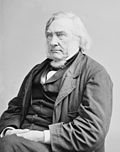 | Samuel Nelson | Thompson | February 14, 1845
(Acclamation) | February 27, 1845
–
November 28, 1872
(Retired) | John Tyler | Chief Justice of the New York Supreme Court
(1831–1845) |
| 26 |  | Levi Woodbury | Story | January 31, 1846
(Acclamation) | September 23, 1845 [e]
–
September 4, 1851
(Died) | James K. Polk | 13th
United States secretary of the treasury
(1834–1841) |
| 27 |  | Robert Cooper Grier | Baldwin | August 4, 1846
(Acclamation) | August 10, 1846
–
January 31, 1870
(Retired) | Judge for the
Pennsylvania state District Court
for Allegheny County
(1833–1846) |
| 28 |  | Benjamin Robbins Curtis | Woodbury | December 20, 1851
(Acclamation) | October 10, 1851 [e]
–
September 30, 1857
(Resigned) | Millard Fillmore | Massachusetts state representative |
| 29 | 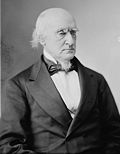 | John Archibald Campbell | McKinley | March 22, 1853
(Acclamation) | April 11, 1853
–
April 30, 1861
(Resigned) | Franklin Pierce | Alabama state representative |
| 30 | 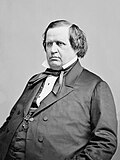 | Nathan Clifford | Curtis | January 12, 1858
(26–23) | January 21, 1858
–
July 25, 1881
(Died) | James Buchanan | 19th
United States attorney general
(1846–1848) |
| 31 |  | Noah Haynes Swayne | McLean | January 24, 1862
(38–1) | January 27, 1862
–
January 24, 1881
(Retired) | Abraham Lincoln | U.S. attorney for the
District of Ohio
(1830–1834) |
| 32 |  | Samuel Freeman Miller | Daniel | July 16, 1862
(Acclamation) | July 21, 1862
–
October 13, 1890
(Died) | Lawyer,
Private practice |
| 33 |  | David Davis | Campbell | December 8, 1862
(Acclamation) | December 10, 1862 [e]
–
March 3, 1877
(Resigned) | Judge of the
Illinois 3rd Circuit Court
(1848–1862) |
| 34 |  | Stephen Johnson Field | (new seat) | March 10, 1863
(Acclamation) | May 20, 1863
–
December 1, 1897
(Retired) | 5th
chief justice of California
(1859–1863) |
| 35 |  | William Strong | Grier | February 18, 1870
(Acclamation) | March 14, 1870
–
December 14, 1880
(Retired) | Ulysses S. Grant | U.S. representative for
Pennsylvania's 9th district
(1847–1851) |
| 36 | 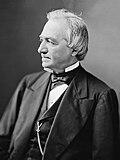 | Joseph P. Bradley | (new seat) | March 21, 1870
(46–9) | March 23, 1870
–
January 22, 1892
(Died) | Lawyer,
Private practice |
| 37 |  | Ward Hunt | Nelson | December 11, 1872
(Acclamation) | January 9, 1873
–
January 27, 1882
(Retired) | Chief Judge of the
New York Court of Appeals
(1868–1872) |
| 38 | 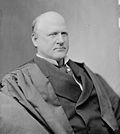 | John Marshall Harlan | Davis | December 10, 1877
(Acclamation) | November 29, 1877
–
October 14, 1911
(Died) | Rutherford B. Hayes | 14th
attorney general of Kentucky
(1863–1867) |
| 39 |  | William Burnham Woods | Strong | December 21, 1880
(39–8) | January 5, 1881
–
May 14, 1887
(Died) | Judge of the
United States Court of Appeals
for the Fifth Circuit
(1869–1880) |
| 40 |  | Stanley Matthews | Swayne | May 12, 1881
(24–23) | May 17, 1881
–
March 22, 1889
(Died) | James A. Garfield | United States senator
from Ohio
(1877–1879) |
| 41 |  | Horace Gray | Clifford | December 20, 1881
(51–5) | January 9, 1882
–
September 15, 1902
(Died) | Chester A. Arthur | Chief Justice of the
Massachusetts Supreme Judicial Court
(1873–1881) |
| 42 | 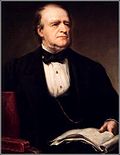 | Samuel Blatchford | Hunt | March 22, 1882
(Acclamation) | April 3, 1882
–
July 7, 1893
(Died) | Judge of the
United States Court of Appeals
for the Second Circuit
(1878–1882) |
| 43 |  | Lucius Quintus
Cincinnatus Lamar II | Woods | January 16, 1888
(32–28) | January 18, 1888
–
January 23, 1893
(Died) | Grover Cleveland | 16th
United States secretary of the interior
(1885–1888) |
| 44 |  | David Josiah Brewer | Matthews | December 18, 1889
(53–11) | January 6, 1890
–
March 28, 1910
(Died) | Benjamin Harrison | Judge of the
United States Court of Appeals
for the Eighth Circuit
(1884–1889) |
| 45 |  | Henry Billings Brown | Miller | December 29, 1890
(Acclamation) | January 5, 1891
–
May 28, 1906
(Retired) | Judge of the
United States District Court
for the Eastern District of Michigan
(1875–1890) |
| 46 | 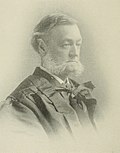 | George Shiras Jr. | Bradley | July 26, 1892
(Acclamation) | October 10, 1892
–
February 23, 1903
(Retired) | Lawyer,
Private practice |
| 47 | 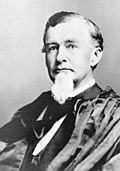 | Howell Edmunds Jackson | L. Lamar | February 18, 1893
(Acclamation) | March 4, 1893
–
August 8, 1895
(Died) | Judge of the
United States Court of Appeals
for the Sixth Circuit
(1891–1893) |
| 48 | 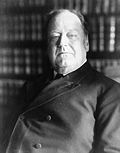 | Edward Douglass White | Blatchford | February 19, 1894
(Acclamation) | March 12, 1894
–
December 18, 1910
(Continued as chief justice) [g] | Grover Cleveland | United States senator
from Louisiana
(1891–1894) |
| 49 |  | Rufus W. Peckham | H. Jackson | December 9, 1895
(Acclamation) | January 6, 1896
–
October 24, 1909
(Died) | Associate Judge of the
New York Court of Appeals |
| 50 | 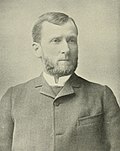 | Joseph McKenna | Field | January 21, 1898
(Acclamation) | January 26, 1898
–
January 5, 1925
(Retired) | William McKinley | 42nd
United States attorney general
(1897–1898) |
| 51 |  | Oliver Wendell Holmes Jr. | Gray | December 4, 1902
(Acclamation) | December 8, 1902
–
January 12, 1932
(Retired) | Theodore Roosevelt | Chief Justice of the
Massachusetts Supreme Judicial Court
(1899–1902) |
| 52 |  | William R. Day | Shiras | February 23, 1903
(Acclamation) | March 2, 1903
–
November 13, 1922
(Retired) | Judge of the
United States Court of Appeals
for the Sixth Circuit
(1899–1903) |
| 53 | 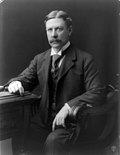 | William Henry Moody | Brown | December 12, 1906
(Acclamation) | December 17, 1906
–
November 20, 1910
(Retired) | 45th
United States attorney general
(1904–1906) |
| 54 |  | Horace Harmon Lurton | Peckham | December 20, 1909
(Acclamation) | January 3, 1910
–
July 12, 1914
(Died) | William Howard Taft | Judge of the
United States Court of Appeals
for the Sixth Circuit
(1893–1909) |
| 55 | 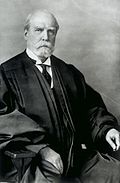 | Charles Evans Hughes | Brewer | May 2, 1910
(Acclamation) | October 10, 1910
–
June 10, 1916
(Resigned) [h] | 36th
governor of New York
(1907–1910) |
| 56 | 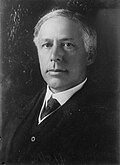 | Willis Van Devanter | E. White | December 15, 1910
(Acclamation) | January 3, 1911
–
June 2, 1937
(Retired) | Judge of the
United States Court of Appeals
for the Eighth Circuit
(1903–1910) |
| 57 |  | Joseph Rucker Lamar | Moody | December 15, 1910
(Acclamation) | January 3, 1911
–
January 2, 1916
(Died) | Associate Justice of the
Supreme Court of Georgia
(1901–1905) |
| 58 | 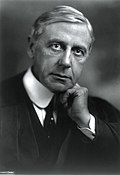 | Mahlon Pitney | J. Harlan | March 13, 1912
(50–26) | March 18, 1912
–
December 31, 1922
(Resigned) | U.S. representative for
New Jersey's 4th district
(1895–1899) |
| 59 | 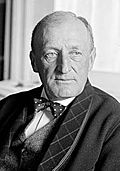 | James Clark McReynolds | Lurton | August 29, 1914
(44–6) | October 12, 1914
–
January 31, 1941
(Retired) | Woodrow Wilson | 48th
United States attorney general
(1913–1914) |
| 60 |  | Louis Brandeis | J. Lamar | June 1, 1916
(47–22) | June 5, 1916
–
February 13, 1939
(Retired) | Lawyer,
Private practice:
Brandeis Dunbar & Nutter [15] |
| 61 | 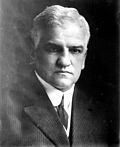 | John Hessin Clarke | Hughes | July 24, 1916
(Acclamation) | October 9, 1916
–
September 5, 1922
(Resigned) | Judge of the
United States District Court
for the Northern District of Ohio
(1914–1916) |
| 62 | 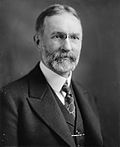 | George Sutherland | Clarke | September 5, 1922
(Acclamation) | October 2, 1922
–
January 17, 1938
(Retired) | Warren G. Harding | United States senator
from Utah
(1905–1917) |
| 63 |  | Pierce Butler | Day | December 21, 1922
(61–8) | January 2, 1923
–
November 16, 1939
(Died) | President of the
Minnesota State Bar Association |
| 64 |  | Edward Terry Sanford | Pitney | January 29, 1923
(Acclamation) | February 19, 1923
–
March 8, 1930
(Died) | Judge of the
United States District Court
for the Middle District of Tennessee
(1908–1923) |
| 65 |  | Harlan F. Stone | McKenna | February 5, 1925
(71–6) | March 2, 1925
–
July 3, 1941
(Continued as chief justice) [i] | Calvin Coolidge | 52nd
United States attorney general
(1924–1925) |
| 66 | 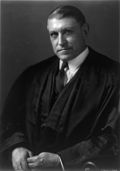 | Owen Roberts | Sanford | May 20, 1930
(Acclamation) | June 2, 1930
–
July 31, 1945
(Resigned) | Herbert Hoover | Assistant District Attorney for Philadelphia |
| 67 |  | Benjamin N. Cardozo | Holmes | February 24, 1932
(Acclamation) | March 14, 1932
–
July 9, 1938
(Died) | Chief Judge of the
New York Court of Appeals
(1927–1932) |
| 68 | 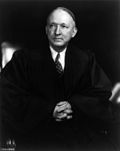 | Hugo Black | Van Devanter | August 17, 1937
(63–16) | August 19, 1937
–
September 17, 1971
(Retired) | Franklin D. Roosevelt | United States senator
from Alabama
(1927–1937) |
| 69 |  | Stanley Forman Reed | Sutherland | January 25, 1938
(Acclamation) | January 31, 1938
–
February 25, 1957
(Retired) | 22nd
United States solicitor general
(1935–1938) |
| 70 |  | Felix Frankfurter | Cardozo | January 17, 1939
(Acclamation) | January 30, 1939
–
August 28, 1962
(Retired) | Chairman of Harvard Law School |
| 71 |  | William O. Douglas | Brandeis | April 4, 1939
(62–4) | April 17, 1939
–
November 12, 1975
(Retired) | 3rd
chairman of the
Securities and Exchange Commission
(1937–1939) |
| 72 |  | Frank Murphy | Butler | January 16, 1940
(Acclamation) | February 5, 1940
–
July 19, 1949
(Died) | 56th
United States attorney general
(1939–1940) |
| 73 |  | James F. Byrnes | McReynolds | June 12, 1941
(Acclamation) | July 8, 1941
–
October 3, 1942
(Resigned) | United States senator
from South Carolina
(1931–1941) |
| 74 | 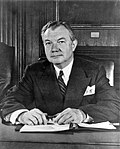 | Robert H. Jackson | Stone | July 7, 1941
(Acclamation) | July 11, 1941
–
October 9, 1954
(Died) | 57th
United States attorney general
(1940–1941) |
| 75 | 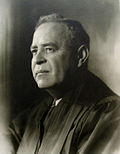 | Wiley Rutledge | Byrnes | February 8, 1943
(Acclamation) | February 15, 1943
–
September 10, 1949
(Died) | Judge of the
United States Court of Appeals
for the District of Columbia Circuit
(1939–1943) |
| 76 |  | Harold H. Burton | Roberts | September 19, 1945
(Acclamation) | October 1, 1945
–
October 13, 1958
(Retired) | Harry S. Truman | United States senator
from Ohio
(1941–1945) |
| 77 |  | Tom C. Clark | Murphy | August 18, 1949
(73–8) | August 24, 1949
–
June 12, 1967
(Retired) | 59th
United States attorney general
(1945–1949) |
| 78 | 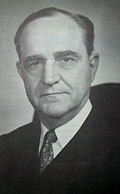 | Sherman Minton | W. Rutledge | October 12, 1949
(48–16) | October 12, 1949
–
October 15, 1956
(Retired) | Judge of the
United States Court of Appeals
for the Seventh Circuit
(1941–1949) |
| 79 |  | John Marshall Harlan II | R. Jackson | March 16, 1955
(71–11) | March 28, 1955
–
September 23, 1971
(Retired) | Dwight D. Eisenhower | Judge of the
United States Court of Appeals
for the Second Circuit
(1954–1955) |
| 80 | 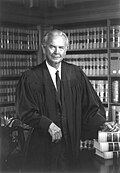 | William J. Brennan Jr. | Minton | March 19, 1957
(Acclamation) | October 15, 1956 [e]
–
July 20, 1990
(Retired) | Associate Justice of the
Supreme Court of New Jersey
(1951–1956) |
| 81 | 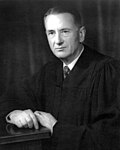 | Charles Evans Whittaker | Reed | March 19, 1957
(Acclamation) | March 25, 1957
–
March 31, 1962
(Retired) | Judge of the
United States Court of Appeals
for the Eighth Circuit
(1956–1957) |
| 82 |  | Potter Stewart | Burton | May 5, 1959
(70–17) | October 14, 1958 [e]
–
July 3, 1981
(Retired) | Judge of the
United States Court of Appeals
for the Sixth Circuit
(1954–1958) |
| 83 |  | Byron White | Whittaker | April 11, 1962
(Acclamation) | April 16, 1962
–
June 28, 1993
(Retired) | John F. Kennedy | 4th
United States deputy attorney general
(1961–1962) |
| 84 | 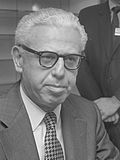 | Arthur Goldberg | Frankfurter | September 25, 1962
(Acclamation) | October 1, 1962
–
July 26, 1965
(Resigned) | 9th
United States secretary of labor
(1961–1962) |
| 85 |  | Abe Fortas | Goldberg | August 11, 1965
(Acclamation) | October 4, 1965
–
May 14, 1969
(Resigned) | Lyndon B. Johnson | United States under secretary of the interior |
| 86 |  | Thurgood Marshall | Clark | August 30, 1967
(69–11) | October 2, 1967
–
October 1, 1991
(Retired) | 32nd
solicitor general of the United States
(1965–1967) |
| 87 | 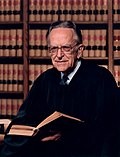 | Harry Blackmun | Fortas | May 12, 1970
(94–0) | June 9, 1970
–
August 3, 1994
(Retired) | Richard Nixon | Judge of the
United States Court of Appeals
for the Eighth Circuit
(1959–1970) |
| 88 |  | Lewis F. Powell Jr. | Black | December 6, 1971
(89–1) | January 7, 1972
–
June 26, 1987
(Retired) | President of the
American Bar Association
(1964–1965) |
| 89 |  | William Rehnquist | J. Harlan II | December 10, 1971
(68–26) | January 7, 1972
–
September 26, 1986
(Continued as chief justice) [j] | United States assistant attorney general
for the Office of Legal Counsel
(1969–1971) |
| 90 |  | John Paul Stevens | Douglas | December 17, 1975
(98–0) | December 19, 1975
–
June 29, 2010
(Retired) | Gerald Ford | Judge of the
United States Court of Appeals
for the Seventh Circuit
(1970–1975) |
| 91 |  | Sandra Day O'Connor | Stewart | September 21, 1981
(99–0) | September 25, 1981
–
January 31, 2006
(Retired) | Ronald Reagan | Judge of the
Arizona Court of Appeals
(1979–1981) |
| 92 |  | Antonin Scalia | Rehnquist | September 17, 1986
(98–0) | September 26, 1986
–
February 13, 2016
(Died) | Judge of the
United States Court of Appeals
for the District of Columbia Circuit
(1982–1986) |
| 93 |  | Anthony Kennedy | Powell | February 3, 1988
(97–0) | February 18, 1988
–
July 31, 2018
(Retired) | Judge of the
United States Court of Appeals
for the Ninth Circuit
(1975–1988) |
| 94 |  | David Souter | Brennan | October 2, 1990
(90–9) | October 9, 1990
–
June 29, 2009
(Retired) | George H. W. Bush | Judge of the
United States Court of Appeals
for the First Circuit
(1990) |
| 95 | 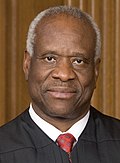 | Clarence Thomas | Marshall | October 15, 1991
(52–48) | October 23, 1991
–
Incumbent | Judge of the
United States Court of Appeals
for the District of Columbia Circuit
(1990–1991) |
| 96 | 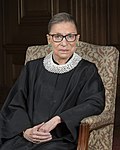 | Ruth Bader Ginsburg | B. White | August 3, 1993
(96–3) | August 10, 1993
–
September 18, 2020
(Died) | Bill Clinton | Judge of the
United States Court of Appeals
for the District of Columbia Circuit
(1980–1993) |
| 97 |  | Stephen Breyer | Blackmun | July 29, 1994
(87–9) | August 3, 1994
–
June 30, 2022
(Retired) | Chief Judge of the
United States Court of Appeals
for the First Circuit
(1990–1994) |
| 98 |  | Samuel Alito | O'Connor | January 31, 2006
(58–42) | January 31, 2006
–
Incumbent | George W. Bush | Judge of the
United States Court of Appeals
for the Third Circuit
(1990–2006) |
| 99 |  | Sonia Sotomayor | Souter | August 6, 2009
(68–31) | August 8, 2009
–
Incumbent | Barack Obama | Judge of the
United States Court of Appeals
for the Second Circuit
(1998–2009) |
| 100 |  | Elena Kagan | Stevens | August 5, 2010
(63–37) | August 7, 2010
–
Incumbent | 45th
solicitor general of the United States
(2009–2010) |
| 101 |  | Neil Gorsuch | Scalia | April 7, 2017
(54–45) | April 10, 2017
–
Incumbent | Donald Trump | Judge of the
United States Court of Appeals
for the Tenth Circuit
(2006–2017) |
| 102 |  | Brett Kavanaugh | Kennedy | October 6, 2018
(50–48) | October 6, 2018
–
Incumbent | Judge of the
United States Court of Appeals
for the District of Columbia Circuit
(2006–2018) |
| 103 |  | Amy Coney Barrett | Ginsburg | October 26, 2020
(52–48) | October 27, 2020
–
Incumbent | Judge of the
United States Court of Appeals
for the Seventh Circuit
(2017–2020) |
| 104 |  | Ketanji Brown Jackson | Breyer | April 7, 2022
(53–47) | June 30, 2022
–
Incumbent | Joe Biden | Judge of the
United States Court of Appeals
for the District of Columbia Circuit
(2021–2022) |

















































































































